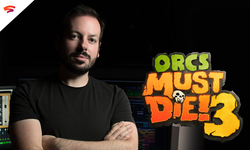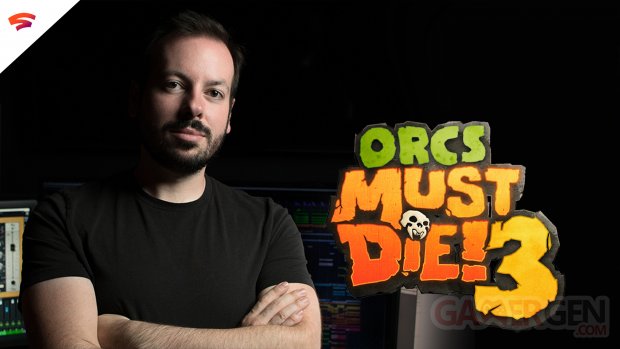
Orcs Must Die! 3 : pour le compositeur Phill Boucher « écrire de la musique médiévale/métal, c’était la cerise sur le gâteau ! »
par Pierre Wilmart , Eric de BrocartPhill Boucher, le compositeur en charge de la bande-son d'Orcs Must Die! 3, a pris le temps de répondre à quelques-unes de nos questions sur cette exclusivité Stadia développée par Robot Entertainment
Voici la version originale de l'interview de Phil Boucher.
1. Phill Boucher, can you introduce yourself to our readers?
Hi, I’m Phill Boucher and I’m the composer of Orcs Must Die! 3.
2. What were the key stages in your career as a musician/composer?
I’ve been into music from as far back as I can remember. My first instrument was the trumpet in elementary school, but things really clicked when I started playing the guitar.
After my high school metal band days, I went to Berklee College of Music, where I graduated with a dual degree in Film Scoring and Music Production & Engineering. After college, I moved to Los Angeles and assisted a couple of composers before eventually making my way to Hans Zimmer’s studio in Santa Monica, where I met and assisted Geoff Zanelli. That was a turning point for me - seeing how someone working on the biggest films in the world works. Not just writing music, but programming, taking meetings, work-ethic, the whole thing. Geoff mentored me and started giving me more and more opportunities - starting with programming some synths and percussion on his cues, to orchestrating, to writing additional music on his films and producing sessions with musicians.3. What led you to write music for video games?
It would be easy to look backwards and connect the dots, but it feels like it all happened by chance. I’ve been a gamer all my life, though I don’t get to play as much these days. My roommate in college ended up becoming a sound designer at a studio in San Diego for awhile, and he introduced me to the rest of the audio team. We all hit it off and became friends. As Geoff’s assistant, I was mostly working on films at the time, but they could tell that I was also interested in game music. It wasn’t until years later, though, that one of them reached out to have me write a little bit of music for a game they were working on, and it just sort of took off from there.
4. Is it more difficult to compose for a video game than for other media?
Yes and no. There are unique challenges of implementation and working out the systems that will deliver the most satisfying experience for the player - that’s not a consideration in linear media. Additionally, I’m quite often writing music for areas of a game that aren’t designed yet, so it can be hard to have a good sense of what the music should feel like at times. That said, I don’t have to worry about hitting unmusical picture edits or adjusting to timing changes like there is in film or TV. It’s much easier to have complete musical ideas - no one is stopping me from adding an extra bar or two to complete a phrase.
5. What attracted you to the Orcs Must Die! 3 project?
Having previously worked with Robot on ReadySet Heroes, I knew that everyone on the team was incredibly talented, dedicated, and easy to work with. I jumped at the chance to be a part of their game again. Having an excuse to break out the guitars and write some medieval metal music was just the icing on the cake!
6. By the way, what were your specifications with OMD3?
Rodney Gates, the audio director at Robot, and I worked hard to come up with a music system that would adapt to the gameplay, but also not become annoying or draw too much attention to itself. In the end, most of the music operates on a layer system that will grow and shrink with the action.
7. In OMD3, what is your favorite song and which one gave you the most trouble and why?
I really enjoyed writing the music for the villain of the game. I used an instrument called a Guitarviol for his theme. It’s a hybrid between an arpeggione from the 19th century and a modern electric guitar. You bow it, so it sounds a bit like a cello, but it also has a pickup that can make it sound like a crazy distorted guitar. Getting to explore new sounds and textures with that was a blast.
I can’t say that any of it ever comes easy, but thanks to some early conversations with the designers at Robot, we locked into the sound pretty quickly. The biggest challenge was trying to determine just how intense the battle music in the game should be. We knew the general maps had to have some urgency and excitement to them, but that we needed room to get truly big for the war scenarios, something new to Orcs Must Die! 3.8. What would you like to read about your music in OMD3 in the press and on social channels?
I knew I had big shoes to fill when I was hired for the game. Chris Rickwood wrote some great music for the franchise and those scores rightfully have a lot of fans. We’ve tried to take the music in a slightly different direction without abandoning what made those soundtracks work so well. So, I hope people will feel we’ve lived up to the legacy of the OMD franchise.
Thanks so much!

Commenter 0 commentaire
Soyez le premier à commenter ce contenu !